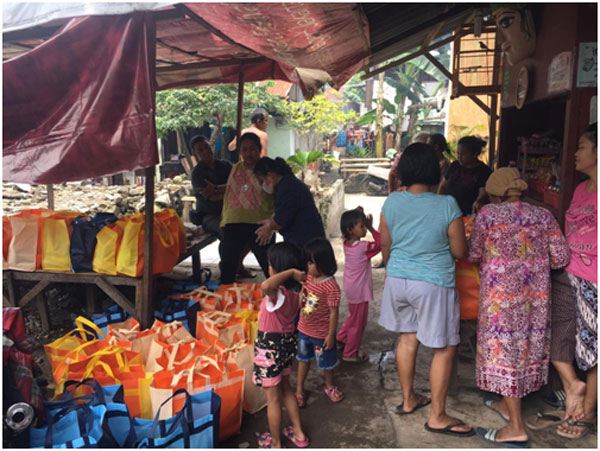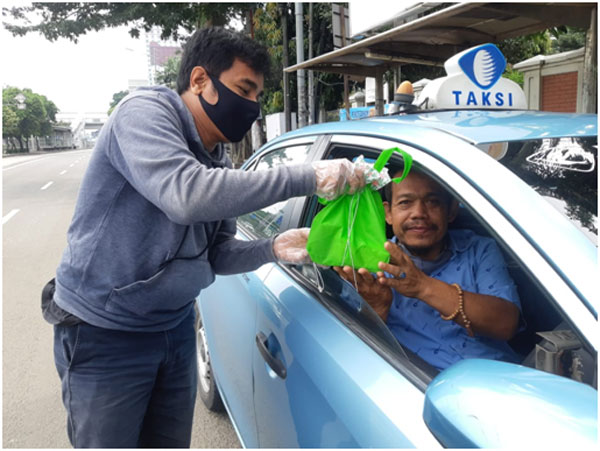As a journalist, 27-year old GhinaGhaliya has to collect and verify information about what is happening on the ground, with no exception on COVID-19 cases. She learned that with many companies implementing WFH policy and the government issuing social distancing orders, the informal workforce has been hard hit. Taxi drivers, construction workers, street vendors, security staff have seen their income evaporate overnight.
So while verifying facts on the field, she and several fellow journalists were inspired to create a crowdfunding platform to raise funds for this group. She then created an inter-media journalist community on Mach, 26 and started crowdfunding activities. As per April, 1, 144.2 million rupiah had been raised and distributed to more than 220 beneficiaries around greater Jakarta in the form of staple food packages, vitamin packages, personal protective equipment, and cash. She is going to continue her crowdfunding platform until the government’s preparation of its social safety net program has been finalized.
“With this donation, I hope the poor people around Greater Jakarta can survive amidst the current situation without have to spend lot time outside their homes. Also with the protective gear, they can continue to work safely and have enough vitamins which are hard to find and are pricey,” she said.
Meanwhile, YudaFajrin a 32 year old satay entrepreneur who owns the Satay Kato restaurant also decided to lend a helping hand for ride hailing drivers that had been affected by the social distancing policy during COVID-19 outbreak. He gives free rice and satay to drivers around his restaurants in Jakarta, Semarang, Bandung, Bogor and Jogjakarta. His decision has triggered his fellow restaurant owners to hand in hand give donation to drivers. From 25 March until 31 March they had raised 52.2 million rupiah in donations that was channeled to more than 4,000 drivers in the form of rice boxes.
“Initially, I was worried about their immunity during the COVID-19 period where they reduce their food portion per day. So I decide to donate what I have, satay. We will continue our donation activity next week, and will add some cash money for drivers with age more than 50 years,” he said.
Social distancing policies and stricter travel restrictions imposed since the initial outbreak of COVID-9 threaten the livelihood of the lower income groups the most.
The World Bank has estimated that more than 11 million people could fall into poverty in East Asian-Pacific countries. The financial shock of the pandemic will have a serious impact on poverty, defined as a situation where an individual earns less than $5.5 a day. In Indonesia, only one in five people is economically secure, according to the World Bank report Aspiring Indonesia. Around 24.8 million Indonesians live on under US$1 a day — 9.22 percent of the population — and more than 60 million are vulnerable to falling into poverty.
Conglomerates Chip in

Individuals such as GhinaGhaliya are the not the only ones chipping in to help the needy during these difficult times. For instance, travel agent Panorama Group is collaborating with the Ministry of Tourism and Creative Economy in providing transportation for medical crew to move from hospitals to hotels where they can rest. The group has sent 11 buses to the reference hospitals.
“We as representatives from the tourism industry that also been impacted by COVID-19 want to be hand-in-hand with people to combat this virus so that our lives can return to normal like before,” said AB Sadewa, VP for Brand Communication.
Benny Soetrisno, Commissioner of PT Asia Pacific InvestamaTbk as well as Chairperson of the Indonesia Textile Association said that since the textile or garment industry faces “vacuum” conditions in the domestic market, given the the shutdown of the Tanah Abang market, they are reorienting production to masks and personal protection equipment for medical crew. This is to maintain cashflow, ahead of Ramadhan where companies are obligated to pay THR to employees.
The same conditions also occur in export oriented producers where their buyers have suspended and even canceled orders. So rather than face total lost, they are reorienting to produce masks and PPE because the demand of mask and PPE are higher than supply.
“Some of us are selling as regular commodity, but many of us also donate it through Indonesia Red Cross Society Central Office,” he said.
Other large companies and conglomerates have also collaborated with National Agency for Disaster Countermeasure (BNPB) as the lead of COVID-19 Countermeasure Taskforce. For instance, the Bakrie Group has donated 20 billion rupiah, Adaro Group has donated 20 billion rupiah, Astra Group has donated 63 billion rupiah, Mayapada Group has donated 52 billion rupiah, Paragon Technology and Innovation has donated 40 billion rupiah and so on.
Apart from those mentioned, the Sinarmas Group with other conglomerates including Djarum Group, Indofood, Triputra, Agung Sedayu, ArthaGraha and Adaro have also created a crowdfunding platform that aims to raise 500 billion charity fund to be channeled through the Budha Tzu Chi foundation that will be focused on health facilities.
Government Social Safety Net Program
As the economic fallout form the pandemic intensifies, the Government has issued its third COVID-19 stimulus worth 405.1 trillion rupiah. Of this amount, 110 trillion rupiah will be allocated for social safety net programs, as suggested by the World Bank. The World Bank’s East Asia Pacific chief economist AadityaMattoo has urged the government to find a way to soften the pain both for households and informal workers. Since the pandemic required drastic action, such as strong social distancing and travel restrictions, the government had to provide compensation for informal-sector workers, such as by devising new sick pay arrangements.
The breakdown for the social safety net program are as follows: 8.3 trillion rupiah for additional assistance for the 10 million families in the family hope program (PKH); 10.9 trillion rupiah for staple food program to additional 4.8 million families from current 15.2 million families; 10 trillion rupiah for 5.6 million lay-off worker/ informal workers/ SME in the form of pre working card, 3.5 trillion rupiah for free electricity for 24 million customers using 450 KVa and 7 million customers using 900 KVa, 1.5 trillion rupiah for MBR housing incentive and 30.8 trillion rupiah for other program that will be discussed later.
“We are discussing with the Coordinating Ministry for Human Development and Culture Affairs, BPJS, regional governors, mayors, the Ministry of Public Work and Housing as well as the Coordinating Ministry of Economic Affairs to capture more informal workers since our national identity card (NIK) does not store informal workers data. We will allocate pre working card and staple food program more on them,” noted Sri MulyaniIndrawati, Ministry of Finance.
Coordinating Minister for Economic Affairs AirlanggaHartarto said that pre working card (worth 20 trillion in total) is expected to keep worker purchasing power as well as help micro and SME businesses that have decreased income or loss jobs. There will be 5.6 million beneficiaries for the program, where each beneficiary will receive 3.5 million rupiah.
“Formal and informal workers that has been affected by COVID-19 can register their selves on www.prakerja.go.id,” he said.

